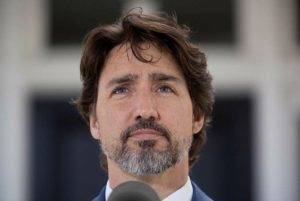What would an ethical recovery look like?
OTTAWA—Canadians are not accustomed to Googling the websites of their various houses of worship for scintillatingly brilliant advice on how to design vibrant economies. That might be as useful as asking the current denizen of the White House for clues on hairstyling.
But if faith communities are places where adherents go to have their moral and ethical batteries re-charged, what advice is currently being offering to a Canadian public under lockdown, slowly emerging into a future masked with uncertainty?
Times of great disruption in history have often birthed life-changing moments when once-cherished dreams have unfolded into new realities. Developing a just and “green” recovery strategy could very well be the moral challenge of our age.
Will North American religious leadership emerge to guide us with solid ethical principles on which to base the emerging “new-normal” Canadian society?
Pope Francis is one leader who is unafraid to call on our better instincts, even while surrounded by suffering in the European country hardest hit by the COVID-19 pandemic. As the Pope wrote shortly after Easter, “This may be the time to consider a universal basic wage.”
 In Canada, 43 Lutheran and Anglican bishops (notably unaccompanied by their more timid Catholic counterparts) took a cue from the Roman Pope on May 3, calling upon Prime Minister Justin Trudeau to immediately institute a “guaranteed basic income for all.” The bishops wrote, “We would extend and amplify the Pontiff’s remarks: “This is the time.” According to these bishops, “GBI represents a positive nation-building policy option for today and for tomorrow. It can become the great, transformational legacy, left by this government, which arises from this pandemic, paralleling the great social gains which arose during and after earlier conflicts: public health insurance and equal rights.”
In Canada, 43 Lutheran and Anglican bishops (notably unaccompanied by their more timid Catholic counterparts) took a cue from the Roman Pope on May 3, calling upon Prime Minister Justin Trudeau to immediately institute a “guaranteed basic income for all.” The bishops wrote, “We would extend and amplify the Pontiff’s remarks: “This is the time.” According to these bishops, “GBI represents a positive nation-building policy option for today and for tomorrow. It can become the great, transformational legacy, left by this government, which arises from this pandemic, paralleling the great social gains which arose during and after earlier conflicts: public health insurance and equal rights.”
In terms of the “green” recovery Canada also needs, a new coalition of faith communities was launched on Earth Day, April 22. Called “For the Love of Creation: A Faith-based Initiative for Climate Justice,” the organization plans to educate congregations and to lobby the federal government on climate change policy.
An immediate action growing out of this resolve is an initiative called “Catholics United for Climate Action.” The organizers are principally members of Catholic religious communities, predominantly religious women. Last September, 64 congregations of Canadian nuns signed a declaration calling for more federal government ambition on climate action. The sisters are not waiting around for their male counterparts to approve or join them—that’s clearly part of “the old normal.”
Catholics for Climate Action have assembled hundreds of signatures in a letter to Trudeau, to be released on May 25 (the fifth anniversary of the Pope’s first-ever encyclical on the environment.) They reject bailouts of the oil and gas industries, instead urging government to “implement the commitment to table and then pass in Parliament the Just Transition Act. This should include strengthening measures to provide oil and gas workers with direct immediate relief and opportunities for training, education and employment in existing low-carbon sectors.”
The passage of legislation—which died in the Senate last year—to implement the UN Declaration on the Rights of Indigenous Peoples, is also a priority. Signatories call for increased investment in renewable energy, public transit, building retrofits, and “investing in a circular economy that achieves significant reduction of plastic waste.”
Their call for change in Canada does not ignore international solidarity, either. The letter reiterates long-standing demands for multilateral debt cancellation for countries of the global south, now struggling to meet the challenges of the pandemic as well as the climate crisis. In short, signatories are “urging the Canadian government to join this commitment and take immediate concrete actions to flatten the curve of global warming and move towards a just and sustainable future.”
Tough decisions lie before Canadians as we emerge from the COVID pandemic. How will we ensure the future economic cure does not become worse than the structural disease that left so many, so vulnerable? What are we willing to let go, in order to refuse to return to the previous “climate emergency”? When a vaccine is discovered, who deserves to be first in line? And will we be willing to share life-saving measures with those unable to pay in the global south? Will we erect new borders for undocumented migrants lining up to try to save the lives of their families? Will today’s physical distancing morph into tomorrow’s moral distancing from the vulnerable?
Will faith communities be active participants in shaping the new ethical normal?
By Joe Gunn
Joe Gunn is the executive director of the Centre Oblat: A Voice for Justice at St. Paul University in Ottawa.
Originally published on the Hill Times, May 25, 2020


